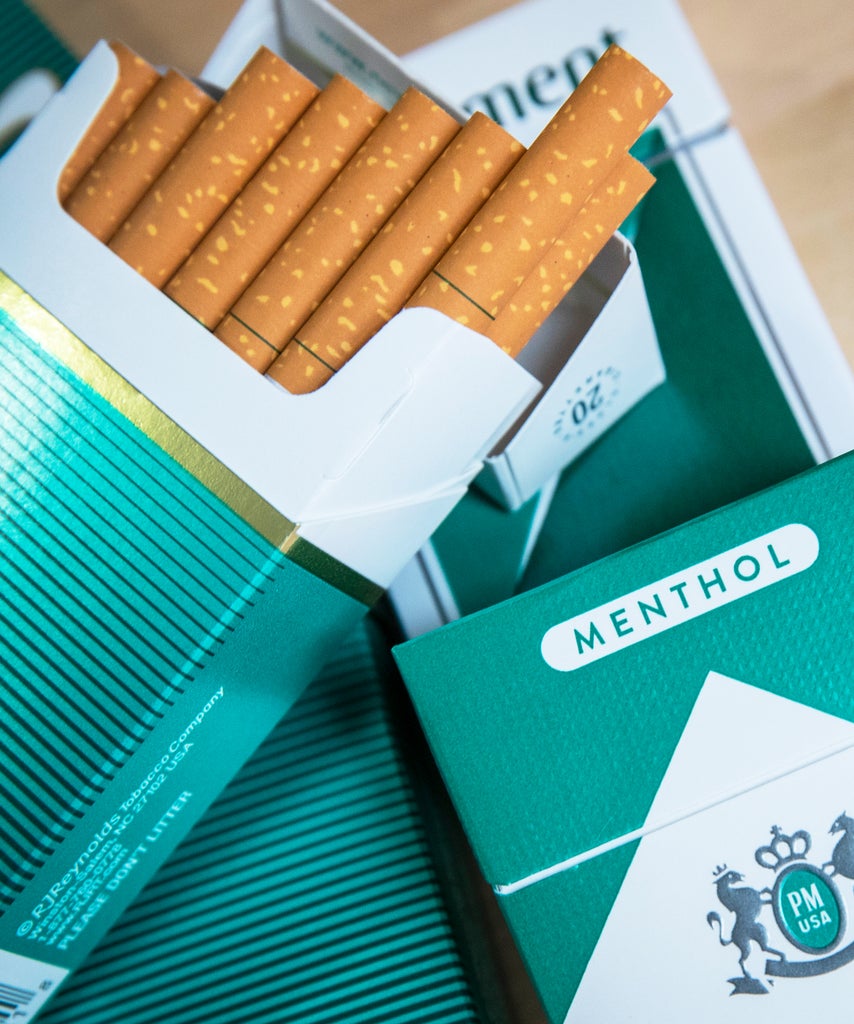
This week, administration officials reported that President Joe Biden will propose a ban on menthol cigarettes in an attempt to improve public health. The announcement, first reported on by The Washington Post, comes after years of health and civil rights groups pushing for restrictions on menthol cigarette sales. Some advocates argue that tobacco companies heavily advertise menthol products to Black communities, which plays into America’s life-threatening, colossal health disparity.
“COVID-19 and the racial awakening we had last summer exposed the inequities in our system,” Delmonte Jefferson, director of the Center for Black Health & Equity, told NBC News. He described menthol as “just another example of the health inequities that have plagued African-Americans for generations.”
Anti-smoking advocates also say that it’s important for the Food and Drug Administration (FDA) to take action against nicotine products often sold to and popular among young people, including cigarettes with “characterizing flavors other than menthol.” The FDA limited the sale of flavored e-cigarettes in 2018, but public health advocates filed a petition back in 2013 arguing that menthol should count as a “characterizing flavor.” Following a 2020 lawsuit, the FDA is expected to finally respond to the petition this week.
“Menthol cigarettes are the No. 1 cause of youth smoking in the United States,” Matthew L. Myers, president of Campaign for Tobacco-Free Kids, told The New York Times. “Eliminating menthol cigarettes and flavored cigars used by so many kids will do more in the long run to reduce tobacco-related disease than any action the federal government has ever taken.”
Advocacy groups believe that menthol products, known for their cooling, minty effect and taste, are often an easy and addictive entry point to other nicotine products. They’re also overwhelmingly marketed to Black people, through what the Centers for Disease Control and Prevention (CDC) calls “culturally tailored advertising images and messages.” As a result, over 70% of young Black smokers say they use menthol cigarettes — a significantly higher percentage than their Hispanic, Asian, and white counterparts, reported the anti-smoking group Truth Initiative.
From 2012 to 2014, 86% of Black smokers said they prefer menthol cigarettes, compared to just 28.9% of white smokers. This is particularly shameful given the many studies that prove Black people are more likely to die from smoking-related causes.
In 2020, Rep. Karen Bass, then-chair of the Congressional Black Caucus, slammed the tobacco industry’s “greedy and ruthless strategy” to target Black communities. “Black Americans die from heart disease, lung cancer, stroke, and other tobacco-related diseases at rates far higher than others,” Bass wrote. “For far too long, tobacco companies have continuously been allowed to market their deadly products in our communities without regard for the enormous cost in Black lives and health, despite repeated calls for action to force them to stop.”
But some say that Biden’s plan could harm the very same communities his administration is trying to help. If menthol products are made illegal, this means Black people will also be disproportionately penalized for smoking. This, combined with data showing Black Americans are four times more likely than white Americans to be arrested for violating marijuana possession laws, raises concerns that the ban could further exacerbate our country’s racial justice problems if being in possession of menthol cigarettes is criminalized. Biden’s choice to focus on the impact of menthol on health and mortality disparities is an important one, but a ban might not be the best way to fix such a multilayered problem.
The ACLU, along with over two dozen civil rights and drug policy groups, warned about this in a letter to the U.S. Department of Health and Human Services. “Well-intentioned efforts to continue to reduce death and disease from tobacco products must avoid solutions that will create yet another reason for armed police to engage citizens on the street based on pretext or conduct that does not pose a threat to public safety,” the organization wrote. “Banning menthol cigarettes risks massive setbacks to our criminal justice system at precisely the moment we should be advancing reform.”
That said, the NAACP and several Black doctors groups have come out in support of the menthol cigarette ban, stating in a letter that it would likely target manufacturers rather than creating criminal penalties. “A ban on menthol cigarettes and flavored cigars would do more to reduce youth tobacco use and health disparities than any other single action the federal government has ever undertaken,” Matthew Myers, president of the Campaign for Tobacco-Free Kids, said to the Post.
Like what you see? How about some more R29 goodness, right here?
Biden Is Being A Cop About His Staff's Weed Use
Quitting E-Cigarettes Is A Little Complicated
Why Don’t Black Women Get To Be Stoners Onscreen?
from Refinery29 https://ift.tt/3xwxB9E
via IFTTT

